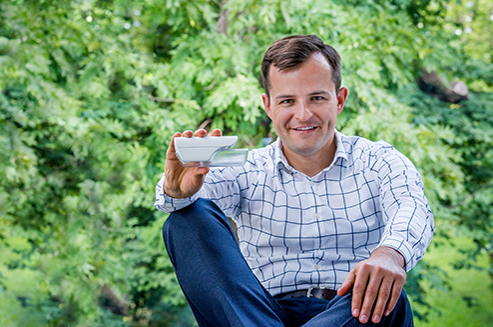In total, more than 300 million people worldwide suffer from one of these pathologies that prevent an individual from breathing normally. Treating them early can help to slow the progress of these diseases, but there are millions of patients who have never even been diagnosed. And for those who have, there are large regional disparities in the medical care they receive: 90% of COPD related deaths occur in low-income countries with limited resources.
Despite the fact that these pathologies are chronic, the medical attention received by the patients is episodic. The patients visit specialists during crises, but the rest of the time they are “more or less on their own,” Łukasz Kołtowski explains. This young doctor has developed a solution for these patients whose ingenuity has led to his selection as one of MIT Technology Review´s Innovators Under 35 Poland 2016.
Kołtowski is the CEO of the company Health Up, where he has designed a fist-sized, portable spirometer called MySpiroo which continually monitors respiratory function. The patient blows into the device, which captures the parameters that would be measured by a standard spirometer through low-power MEMS sensors. Via Bluetooth, the device connects to a mobile phone, where the users can view track their results and share them with their physician, or with Health Kit, Google Fit and other applications.
Łukasz Kołtowski aims for doctors to use MySpiroo during home visits to patients. But in future, he plans to cross MySpiroo´s data with data collected through different health-related wearables and sensors – like a user´s weight or the level of atmospheric pollution – in order to offer recommendations to the users. The company hopes to achieve a CE marking this year and to perform safety tests on the device through trials to be conducted in several clinics in Poland.
According to the Executive Director of Digital Banking at BGŻ BNP Paribas and jury member for the Innovators Under 35 Poland 2016 awards, Piotr Marciniak, MySpiroo “simplifies existing processes and improves the quality of life for an important number of current and future patients.”
Source: Innovators under 35
Photo © Dominik Tryba


